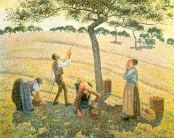Le Cidre
Lyrics
Le cidre
words & music Mike Ford
Je suis pas de l’Angleterre – suis pas des États
Je suis pas de l’Angleterre – suis pas des États
Mes aïeux venaient de la France
Bom bidi bom bom
Oh, si mes pommiers ont un beau printemps
On boira du cidre cet hiver
La vie, elle est belle à la frontière, au bord du détroit
La vie, elle est belle à la frontière, au bord du détroit
Mes aïeux voulaient rester
Bom bidi bom bom
Oh, si mes pommiers ont un bel été
On boira du cidre cet hiver
Les soldats ont trainé leurs bottes dans mes champs
Les soldats ont trainé leurs bottes dans mes champs
Mes aïeux, comme ils s'étonnent
Bom bidi bom bom
Oh, si mes pommiers sont la cet automne
On boira du cidre cet hiver
Notes
I wanted to write a song in French that described something of what we now call the Windsor-Detroit area. It was a strategically crucial area in 1812/13, seeing some intense action and changing hands several times. The Detroit River was an important place for many First Nations for centuries, and in the century leading up to the War of 1812 it had become a large French and French Canadian settlement. One of the most popular crops on both sides of the river was apples – often for cider.
I wanted to create a song that was simple – perhaps something an apple farmer might sing while out in the orchard. I wanted it also to reflect the seasons, like in my song Soon (1812).
I believe that songs cannot truly be translated – to do so accurately requires writing a whole new song in the new language. If one does not speak French, perhaps the best way to get the meaning of a song in French is to use a dictionary and explore as many of the lyrics as possible. Feeding the lyrics into a translation app will give a completely ridiculous result, and simply ‘looking up’ the lyrics word-for-word doesn’t reveal much more. To understand what a song might be saying, I prefer exploring the song’s key words, and then listening to the song repeatedly.
That said, I’ve attempted to write a quick English version of the song below, for anyone who is looking to understand the lyrics but may not have the time for the method described above:
I’m not from England, I’m not from The States
I’m not from England, I’m not from The States
My ancestors came from France, if you please
Bom bidi bom bom bom bom
Oh, if the spring is good to my apple trees
We’ll be drinking cider when the cold winter comes
Life is beautiful here on the frontier, on the river straight
Life is beautiful here on the frontier, on the river straight
My ancestors came and felt the breeze
Bom bidi bom bom bom bom
Oh, if the summer is good to my apple trees
We’ll be drinking cider when the cold winter comes
Soldiers came and trampled boots all through my fields
Soldiers came and trampled boots all through my fields
My ancestors turn in their graves and freeze
Bom bidi bom bom bom bom
Oh, don’t let this autumn see the end of my apple trees
And maybe we’ll drink cider when the cold winter comes
Discussion Questions
1.Look at a map of the Great Lakes region. Why would the Detroit River be strategically important?
2.Where would the fort, and later city of Detroit have gotten it’s name? Is there a clue to this in the song?
3.Why does the apple-farmer fear soldiers boots more than great storms or dry spells?
4.Find images of scenes, agricultural or otherwise, where armed conflict has damaged countryside. Find and contrast with images of armed forces personnel doing ‘good works’ in the countryside (eg: Peace Corp assistance, Flood control and relief, Farming assistance, etc.)
Related Activities
1.Create a map of the Windsor-Detroit area, showing which First Nations have had settlements there.
2.Using an artistic medium of your choice, create before-and-after images of countryside that has experienced war battles.
3.Create a dramatic sketch in which a military representative and a farmer are negotiating use of a farm’s field or produce. What are each side’s concerns or needs? What is traded or bartered?
4.Music: Create a ‘field-song’ or ‘work-song’ – one that can be sung without instruments while working – a song in which the rhythm matches the rhythm of the work being done. Find another area of War of 1812 conflict and use the place names and local work involved (eg: corn fields of Five Nations families, boat-building in Kingston harbour, field-clearing in York, etc).


